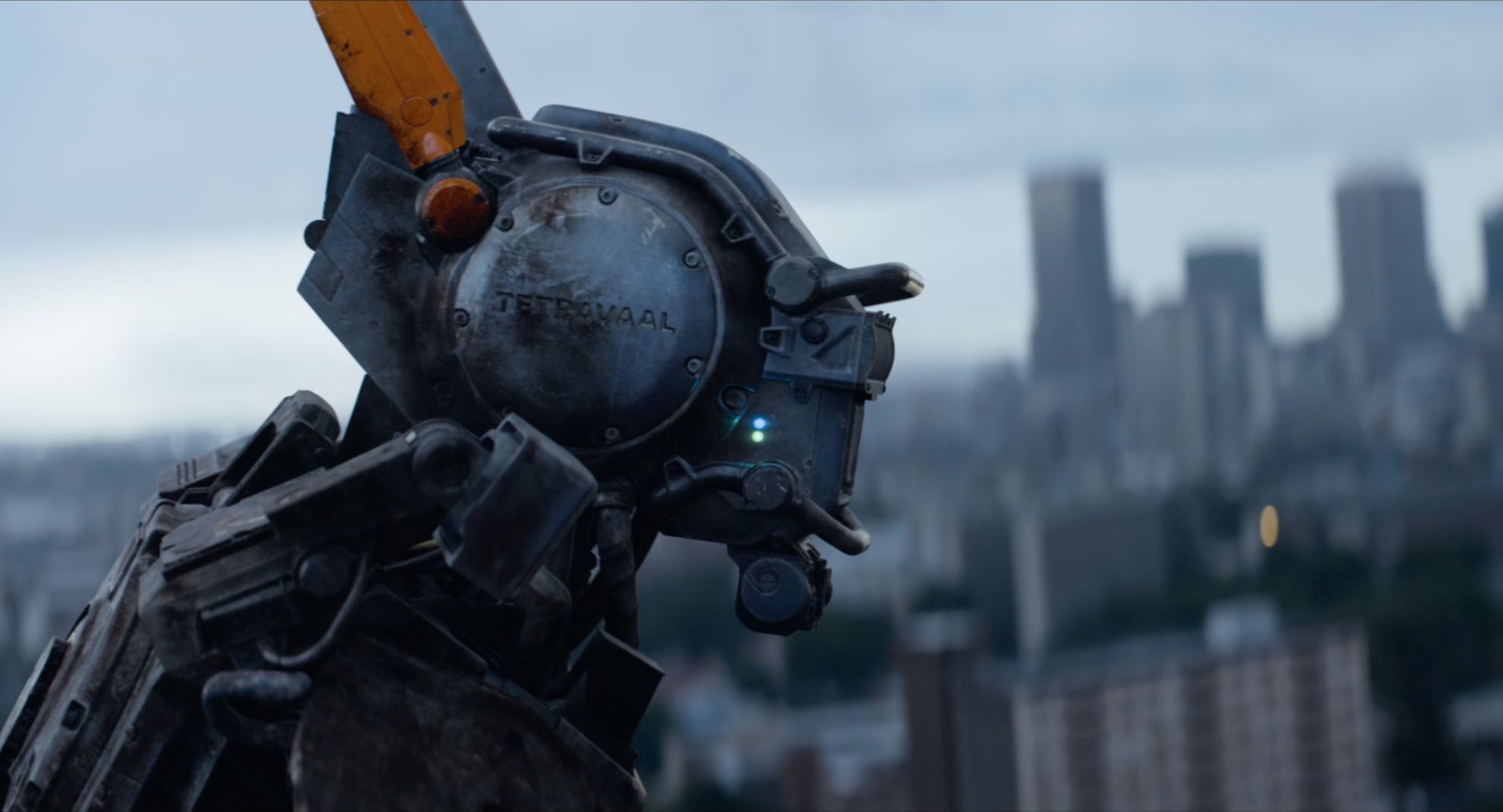Happy Chappie.
Under normal circumstances, it might be considered poor practice to reference other film writing when constructing a review. It’s important for the ongoing significance of the medium that a critic should have the confidence and the perceptiveness to convey original thought without the need to resource the work of their peers. But Neill Blomkamp’s latest film Chappie is far from normal circumstances. Without doubt, the unfavourable reviews that Chappie has provoked are absolutely ludicrous, perhaps an unfortunate consequence of the immense success that the filmmaker generated with his feature debut, District 9. Blomkamp has fallen victim to unreasonable public expectation. In Chappie, he has created a fun, energetic, ambitious and wonderfully weird film, which is more than can be said of a lot of filmmaking, large-budget or otherwise, American or otherwise.
It’s with both surprise and trepidation that I admit that despite myself, I enjoyed Chappie immensely. I say despite myself because from everything I’d seen of the film leading up to the advanced screening that I attended I’d cultivated a rather negative attitude toward the film. The end result is as bizarre as the trailers and posters suggest. It’s a peculiar movie filled with unconventional creative decisions. And yet somehow, Blomkamp’s film is fantastic in its weirdness, from the deranged tonal shifts to the outlandish casting choices to almost everything about Hugh Jackman’s character. There’s a lot that doesn’t work about Chappie. The trick to enjoying it is to embrace it all wholeheartedly, warts and all.
The plot is about as inconsequential as a mainstream film narrative could possibly be. There’s the distinct impression that Blomkamp possibly didn’t want to include much of a plot but knew the film would never have been financed without some form of story progression. In the not too distant future, law enforcement robots are undergoing a period of assessment in Johannesburg, South Africa. The engineer behind the robots, known as Scouts, is Deon Wilson (Dev Patel). Wilson’s primary rival at work is Vincent Moore (Hugh Jackman), a Steve Irwin-esque militaristic engineer (there really is no other way to describe such an off-kilter character) who believes that his own MOOSE robots are far superior to Wilson’s Scouts. The company that both Moore and Wilson work for is weapons manufacturer Tetravaal, headed by the ruthless CEO Michelle Bradley (Sigourney Weaver). Embracing the logistics and operational practices behind Tetravaal will require some radical suspension of disbelief. It’s the sort of top-secret weapons manufacturer in which the security is so lax that characters have no issue breaking in and out and stealing valuable material. At one point, Moore is given complete authority to man a powerfully destructive weapon in any way he sees fit and the decision seems little more than an afterthought.
Wilson is developing a revolutionary form of artificial intelligence and asks Bradley if he can test the system on one of Tetraval’s scouts. Protocol forbids it, but Wilson steals a malfunctioning Scout anyway. Circumstance sets Wilson in the path of a trio of thugs, who kidnap him and force him to go ahead with his plans to install the A.I. system on the stolen robot. The robot is Chappie (Sharlto Copley), who/which the thugs then forcibly take of Wilson’s hands and attempt to induct into their own lifestyle.
By now you may have surmised that the characters, dialogue and plot are awful, but what Chappie lacks in fundamental cinematic language it makes up for its relentless and bewildering ambition. The casting of the Afrikaans rap duo Die Antwoord is possibly the strongest and strangest decision that Blomkamp has made. The characters even listen to Die Antwoord songs and wear Die Antwoord apparel. By all accounts, the key characteristic of Die Antwoord is that the line between parody and earnestness is entirely hazy. Chappie treads a similar line, modulating tones so rapidly that it’s never clear whether the intention is serious or a complete joke. As the film comes to a close, it becomes obvious that it’s all so excessive that you might interpret it either way, or some other way that I might not have thought of. Regardless of Blomkamps’s intent, it’s completely compelling, even if you’re not sure why.
Chappie isn’t concerned with artificial intelligence, despite the concept underlining the film’s basic premise. There’s no shortage of broad ideas in Blomkamp’s work, and Chappie is no exception, but thought isn’t the filmmaker’s end game here, not ought it be. The film is a story of Chappie’s rapid development and a story of the relationships that Chappie develops as a result of that unique development. District 9 might have generated impossible expectations, and Chappie, an unashamedly eccentric and enormously enjoyable film, seems a rejection of those expectations. There’s not much to it, but who cares? It’s a work of zero compromise, which a refreshing change of pace for the conventional film industry. When a film is this entertaining and eccentric, I’m not sure that its failings are all that important. And now, for a very possibly misleading rating out of ten: –
8/10
For more Reviews, click here. If you’re digging ReelGood, sign up to our mailing list for exclusive content, early reviews and chances to win big!

